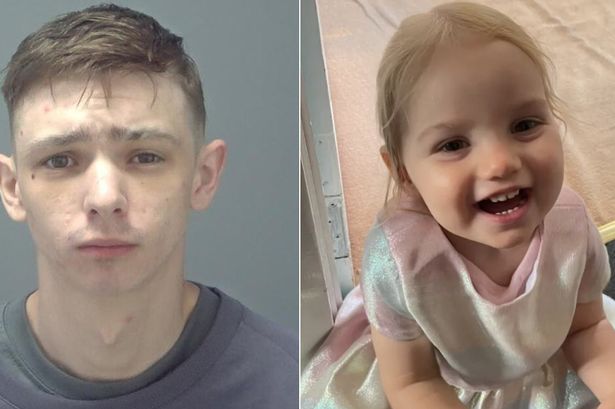Isabella Wheildon, a vulnerable 16-month-old toddler, tragically lost her life due to a catastrophic bone marrow embolism, a direct consequence of the severe injuries inflicted upon her. The horrific assault, described as akin to being “kicked by a horse,” left Isabella with devastating internal injuries that ultimately led to the embolism, which blocked the flow of blood to her lungs and other vital organs. The perpetrator of this brutal act was identified as Jake Tremblay, the boyfriend of Isabella’s mother, Brittany Burkhalter. This unspeakable crime shocked the community and highlighted the tragic consequences of domestic violence and child abuse. The investigation that followed revealed a pattern of abuse and neglect within the household, painting a grim picture of Isabella’s short life.
The details of the injuries sustained by Isabella were harrowing. Medical examiners documented extensive internal bruising, particularly in the abdomen, consistent with blunt force trauma. Her small body bore the marks of repeated blows, indicating a sustained and violent attack. The force required to cause such extensive damage, likened to the powerful kick of a horse, speaks to the sheer brutality inflicted upon this defenseless child. The bone marrow embolism, a rare and often fatal complication of severe trauma, occurred when fragments of bone marrow were dislodged from her fractured bones and entered her bloodstream. These fragments then traveled to her lungs and other vital organs, obstructing blood flow and ultimately leading to her death. The medical evidence painted a stark and disturbing picture of Isabella’s final moments, highlighting the extreme suffering she endured.
Jake Tremblay, the man responsible for Isabella’s death, was subsequently arrested and charged with murder. The investigation uncovered a disturbing history of domestic violence and aggression within the household. Witnesses and family members reported previous incidents of Tremblay’s violent behavior towards both Isabella and her mother. These reports, coupled with the overwhelming medical evidence, painted a picture of a volatile and dangerous environment for Isabella. The prosecution presented a strong case against Tremblay, arguing that he intentionally inflicted the injuries that led to Isabella’s death. The trial revealed the extent of the abuse Isabella suffered and exposed the systemic failures that allowed the violence to continue unchecked.
Brittany Burkhalter, Isabella’s mother, also faced scrutiny for her role in the tragedy. While not directly implicated in the physical assault, Burkhalter was charged with child endangerment and neglect. The prosecution argued that she failed to protect Isabella from Tremblay’s abuse and created an environment where such violence could occur. Testimony revealed that Burkhalter was aware of Tremblay’s violent tendencies and had witnessed previous incidents of abuse. Her failure to intervene and protect her daughter contributed to the tragic outcome. The case raised important questions about the responsibilities of caregivers and the complexities of domestic violence situations.
The trial of Jake Tremblay and Brittany Burkhalter captivated the nation, drawing attention to the pervasive issue of child abuse and domestic violence. The tragic death of Isabella Wheildon served as a stark reminder of the vulnerability of children and the devastating consequences of unchecked aggression within the home. The case sparked public outrage and calls for stricter laws and greater support for victims of domestic violence. The community mourned the loss of Isabella, a young life tragically cut short, and demanded justice for the horrific crimes committed against her. The case became a rallying cry for increased awareness and prevention efforts to protect children from abuse.
Isabella’s case highlighted the systemic failures that often allow child abuse to go unnoticed and unaddressed. The need for greater vigilance within communities, schools, and social services became evident. The tragedy underscored the importance of early intervention and support for families struggling with domestic violence. The outpouring of grief and anger following Isabella’s death fueled a national conversation about child protection and the need for a more comprehensive approach to addressing this critical issue. Her story served as a catalyst for change, prompting calls for reforms in child welfare systems and increased resources for families at risk. The legacy of Isabella Wheildon became a symbol of the fight against child abuse and a reminder of the urgent need to protect vulnerable children from harm.














